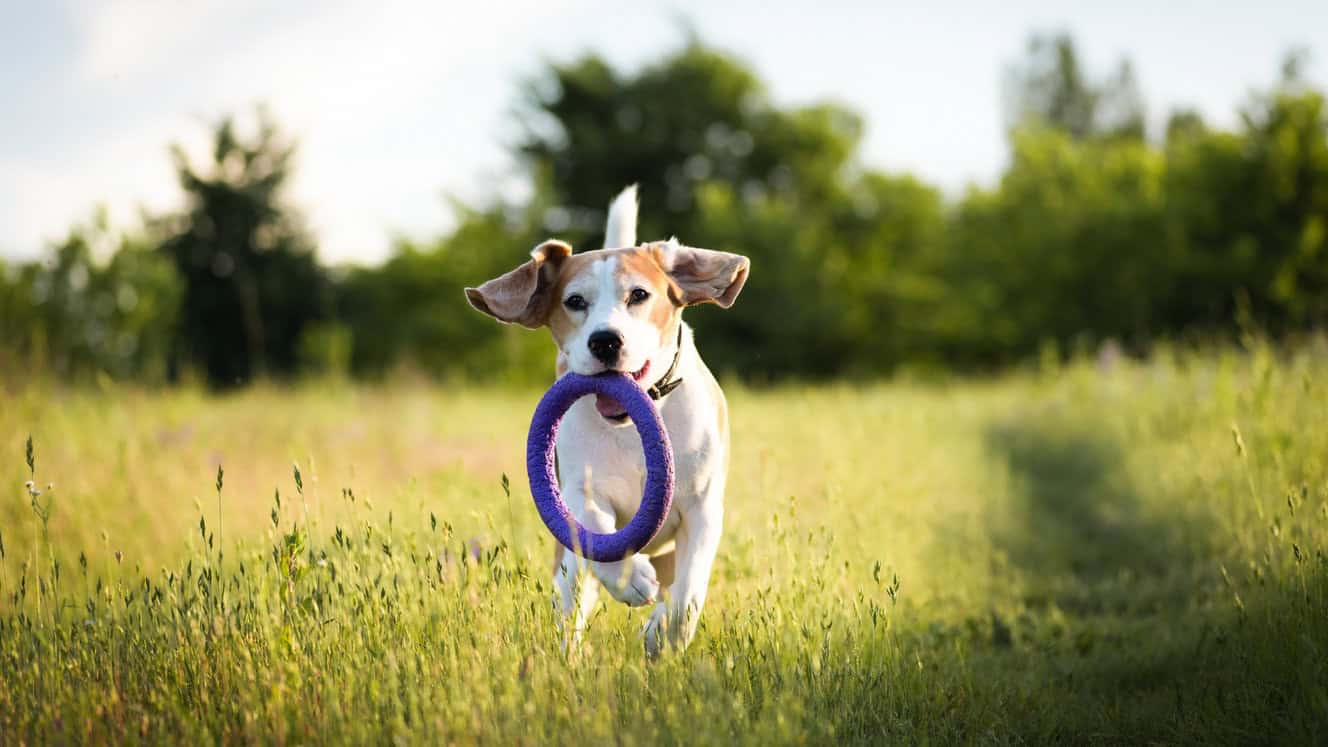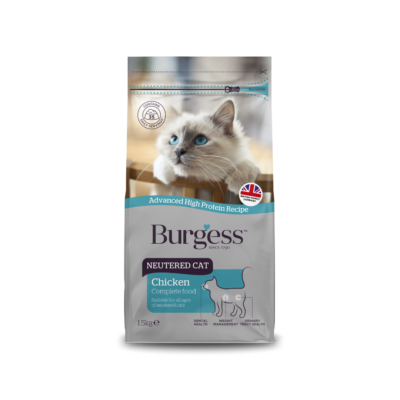
Whether you have a trusty canine chum, captivating cat companion, playful bunny chums or other small furry friends, you’ll know that each and every animal is an individual with their own likes and dislikes, motivations and moods.
Yet when it comes to each of our pets’ personalities and the way they behave with us and other animals they interact with, is this down to nature or nurture?
In a nutshell, ‘nature’ refers to genetic makeup and hereditary factors, which can impact on physical appearance, personality, and physiology, which is the way a living being functions. ‘Nurture’ refers to environmental factors, such as experiences and relationships, which influence behaviour.
“The big question is: does nature or nurture have a greater influence on behaviour? The truth is, you can’t have one without the other,” observes Pet Plan’s dog behaviourist Nick Jones. “Because genetics and the environment combine to impact your pet’s personality, it’s best to focus on the emotions driving your pet's behaviour to discover what’s causing them. But for all pets – socialisation and training also have a huge role to play.”
Show some emotion
Before we explore the importance of socialisation and training, let’s take a moment to consider our pets’ emotions. In its simplest definition, an emotion is a feeling such as happiness, love, fear, anger, or hatred, which can be caused by the situation that you are in or the people you are with. And, just like us humans, pet animals feel a whole range of emotions that directly affect their behaviours.
The Positive Elements Vet says: “Pets, like us, experience joy, fear, frustration, contentment, and more. A dog's bounding enthusiasm while playing fetch isn't just about chasing a ball; it's an expression of pure happiness. A cat hiding under the bed may be dealing with intense anxiety, not simply being stubborn. The way we understand the emotional lives of pets is built on a foundation of animal studies. Scientists have shown that animals experience a wide range of feelings, and even share some of the same neurological pathways for emotion that we do. This deepens our understanding of their behaviours.”
According to The Positive Elements Vet, recognising pets as emotionally complex creatures changes everything about how we interact with them, including:
- Building stronger bonds: Understanding your pet's joy or fear helps you respond in ways that deepen your connection.
- Addressing problem behaviours: Problem behaviours often have an emotional root. Instead of seeing a 'bad' dog barking at guests, we can recognise a frightened dog and address the underlying fear.
- Improving their wellbeing: When we pay attention to our pets' emotions, we can create environments and experiences that support their emotional health, leading to happier, more fulfilled lives.
Understanding more about our companion animals and what they need to live happy and fulfilling lives is key to tapping into the emotions of our dogs, cats, rabbits, guinea pigs and other small pets.
The superpower of reading your pet’s body language
The Positive Elements Vet adds: “Learning to read your pet's body language is a superpower! Tail wags, flattened ears, relaxed postures, or tense muscles all offer clues about their inner state. Combine this with an understanding that pets feel emotions as deeply as we do, and you're ready to build a truly remarkable relationship.”
- Become a dog communication expert >>
- Cat communication guide >>
- How to tell if you have a happy pet >>
Socialisation – what it means and the benefits
All pet experts agree that socialisation is really important. But, in practice, what is it and what are the benefits?
“The word socialisation is a bit misleading and sounds like teaching a new kitten or a new puppy how to socialise with other animals, but it's much more than that,” advises Lifetime Pet Cover.
“Socialising a pet means teaching them to behave well around humans and animals. It helps your pet to be confident in new situations and be comfortable in different environments. Animals react differently when they’re not comfortable or are frightened of something. Some growl or bite, while others hide or shake and shiver. Have you ever thought, why do they act this way even with all the love you give them? One of the most common reasons behind shy, reserved, and sometimes unpredictable nature in pets is them not getting socialised properly from an early age.”
While your vet can advise you on the best ways to socialise your pets, it’s generally a case of gently does it, as you introduce your animal friends to the human world that they may at first find confusing and frightening.
“Socialisation involves gently exposing kittens and puppies to things that they may have to deal with as adults,” explains Lifetime Pet Cover. “It helps them to be relaxed and therefore react appropriately and confidently rather than being fearful and anxious. Take some time exposing your puppy or kitten to new things, and make sure to reward them, using positive reinforcement techniques such as treats, praise, and play.”
It's also important to note that while some animals enjoy different experiences and meeting new people or pets, others will always find this a challenge, but it will help them find ways to cope.
Lifetime Pet Cover adds: “Some cats and dogs do not like to socialise and they’re not as outgoing as others. They don’t enjoy spending time with other animals and people around them. Socialisation is not about teaching them to love these interactions but how to handle them and adjust themselves within their environments.”
- Open up your eyes to your dog’s world >>
- Why your cat always wants to be the centre of your world >>
- Why our small pets are still wild at heart >>
Training – why it provides our pets with essential life skills
Training doesn’t have to be about teaching your pet lots of tricks (although some will enjoy the challenge!). It’s more about equipping them with the skills they need to handle life in a positive way.
* * * * * * * * *
THE KEY TO CALM AND CONFIDENT CANINES
Jacqueline Boyd, Senior Lecturer in Animal Science at Nottingham Trent University, states: “Dogs, like humans, need to learn basic ‘life skills’. The training helps them deal calmly with other dogs and humans – and lets them live a happier, stress-free life. The importance of a ‘canine good citizen’ – a dog that can happily co-exist in human society – should not be underestimated. A well-trained dog benefits humans and dogs alike by enhancing the bond between animal and owner. And well-behaved dogs are less likely to be relinquished too.”
When it comes to dogs and all their different breeds, ‘nature’, as in genetics, does play a significant role in how they behave.
Jacqueline Boyd adds: “It's important to remember that different dog breeds and types have different 'inbuilt' skill sets. Thousands of years of selective breeding means that dogs are one of the most diverse species on the planet, varying in shape, size, overall appearance and behaviour. Different dog breeds and types, from gundogs to hounds, terriers to toy dogs all have individual characteristics. Some, such as gundog breeds – which include Spaniels and Retrievers – will be more likely to carry items or sniff when on lead. Others, such as Collies and Terriers, will be more likely to chase and be interested in moving objects. Dogs that are mixed breed will often show mixed characteristics too. Learning all about your dog's breed and personality traits is important for effective training and rewarding.”
Knowing your dog’s inbuilt skills will enable you to tailor training to channel their energy into something positive and fun.
“Instead of developing an interest in chasing the local cats or wildlife, for example, terriers can be encouraged to partake in controlled chasing of toys,” says Jacqueline Boyd. “Hounds who love to sniff everyone and everything can be trained in scent work as a fun way to exercise their nose, brain and body in a managed way. We can teach young dogs how to behave appropriately through building positive associations with everyday situations and rewarding the behaviours we want. Allowing them to rehearse and repeat good behaviour is key.”
- Whatever age your dog is, training should be part of their regular routine >>
- Good dog! How to make dog training a success >>
- Tailor your training to your dog's personality >>
- Why dogs have become adept at observing and responding to human behaviour >>
* * * * * * * * *
TRAINING AT YOUR CAT’S PACE WILL BUILD YOUR BOND
Cats, too, can benefit from training. Rehoming charity Battersea says: “Basic cat training can help you teach your cat to come to you when called, get them into a cat carrier as well as feel more comfortable being in one, and accept being handled for basic health checks. Cat training will also have the added bonus of giving you the opportunity to interact with your cat in a positive, productive way that will stimulate your cat and strengthen your bond.”
And, as with all pet animals, the best way to train your cat is by using ‘positive reinforcement’.
Battersea adds: “This means rewarding your cat for performing a desired behaviour. You want your cat to be motivated to learn and feel happy and comfortable doing so. The more the cat feels good about doing something we want them to do, the more likely they are to do it. When you are training your cat, you will most often be ‘shaping’ their behaviour by rewarding actions that get closer and closer to the end behaviour you want them to perform. The key to effective cat training is to build up gradually. Identify what you would like them to do, then break this down into small steps, and work through these individually at your cat’s pace.”
Cats Protection notes: “Whether your cat loves a fuss or not, it’s important to remember that most cats like to be in control of any human contact they get. It’s best to let them come to you and give them the choice to move away if they want to.”
- Felines excel at training their human guardians to give them food, attention and a cosy lap to curl up on. But can we train them? >>
- How to play games with cats of all ages >>
- How to choose the best cat toys >>
- Early learning for kittens >>
* * * * * * * * *
FUN WITH YOUR BUNS CAN ENRICH THEIR LIVES
When it comes to rabbits, it’s essential to make training fun, with plenty of suitable tasty treats on offer. Training can add an extra dimension to your rabbits’ lives – but you need to build trust first. As a prey species, rabbits are instinctively wary of anything new or potentially threatening.
Veterinary Surgeon and bunny expert Brian Faulkner advises: “It’s important that your rabbit feels comfortable and familiar with you before you make any demands on them. As your rabbit spends more time with you, they’ll start to trust you, bond with you and feel more confident in your company. Rabbits respond well to the same positive reinforcement techniques used to train dogs and cats. This involves offering them a high-value reward, like food, whenever your rabbit does something you want them to.”
- Bunnies are smart and active creatures who like lots of things to do and games to play >>
- Litter training your rabbits >>
- Every bunny deserves a treat as long as it’s a healthy one >>
And the same approach applies for other small pets such as guinea pigs, ferrets, hamsters, chinchillas, rats, mice, gerbils and degus, who will thrive when humans take the time to build trust, understand what makes them feel safe – and provide them with tasty treats and lots of praise!
- Bonding with your small pets >>
- What puts your small pets in a good mood? >>
- Big ideas for small pets to help them live their best pet lives >>
- Playing games and thinking up new ways to entertain our animal chums is good for us humans too. Here are a few ideas to get your started >>
The Positive Elements Vet adds: “Emotions are at the core of our bond with pets. By understanding and respecting their emotional lives, we create happier homes for everyone.”
From brand new Mini Bales to bargain Bundles, treat your pets today! >>
FIND OUT MORE ABOUT YOUR FAVOURITE SMALL PETS!
Why does my rabbit...? Find answers to all your bunny related questions >>
The secret to healthy, happy guinea pigs >>
How to have happy, chilled chinchillas >>
The ultimate guide to happy, healthy degus >>
The ultimate guide to happy gerbils >>
The ultimate happy pet rat guide >>
Why mice are really rather nice >>
CARE MORE Find lots of useful advice on caring for all your pets from Burgess, the pet experts. Training, nutrition, grooming and general care. It’s all here >>
LOVE PETS? TRUST BURGESS – WE’RE EXPERTS IN OUR FIELD!
Burgess Pet Care is one of the UK's leading pet food manufacturers for the country’s most popular pets – dogs, cats, rabbits, guinea pigs, chinchillas and degus, hamsters, gerbils and mice, rats and ferrets.
At Burgess Pet Care, all our high-quality recipes have been formulated by vets and nutritionists. This ensures they contain the right balance of vitamins and minerals to supplement your pet’s diet to help keep them happy and healthy. With a long tradition of supporting British famers, we actively source all our ingredients as close to our mill as possible.
12 fascinating facts you may not know about Burgess Pet Care! >>
Is your dog a Burgess dog? Your cat a Burgess cat? Your small pets Burgess small pets? Join the Burgess Pet Club for exclusive offers and rewards.
If you found this interesting, you may also like:
MAKE EVERY DAY A PLAY DAY FOR YOUR PETS Not only is play important for young humans, it’s also essential for young animals too. As well as being lots of fun, play is how they learn and explore the world around them.
NEW PETS ON THE BLOCK? From dogs to degus, hamsters to gerbils, cats to chinchillas, ferrets to fancy rats – when did these awesome and amazing animals become our furry companions?
DO YOU HAVE A STRESSED-OUT PET? All pets are individuals and while some can take life’s ups and downs in their stride, other sensitive souls may become stressed and anxious. But there are lots of things you can do to help them feel calmer and happier.
ZOOMIES EXPLAINED Running around in circles? Mad, mid-air twists and spins? When your pet shows a flash of exuberant activity, what does it mean? Ever had a sudden feeling of intense excitement and an unexpected burst of energy that, quite literally, makes you want to jump for joy? It’s the same for our pets too.
PLAY BEHAVIOUR OF CATS SURPRISES SCIENTISTS While there are lots of things that cats do which cause scientists plenty of head-scratching moments, new research into the way that cats play has resulted in some rather baffled boffins...
OUR PETS ARE SO LOYAL AND LOVING, LET’S GIVE IT RIGHT BACK AT THEM Whether your best furry pal is a dog, cat, rabbit, guinea pig, ferret, hamster, rat, gerbil or chinchilla, there’s no doubt that when it comes to being a loving and loyal friend, our pets come out on top. Read these real-life stories.
5 WAYS TO GET THE WHOLE FAMILY INVOLVED IN PET CARE From being involved in looking after a pet and learning a sense of responsibility, to fun activities you can all do together, we’ve 5 IDEAS to get all the family involved.
SHARE THE PET LOVE When it comes to explaining to any non-pet owners just how wonderful, important and special our animal friends are, animal charity Blue Cross has it nailed, stating: “Pets can be our best friends, confidants, motivators and even our teachers. In many cases, they also improve our wellbeing and health.”
NEED A THERAPIST? YOUR PET WILL SEE YOU NOW It’s a widely accepted fact that people of all ages can benefit from a partnership with a pet animal. From being loving and loyal companions to boosting our mental health, our dogs, cats, rabbits, guinea pigs, ferrets and other small pets are amazing life enhancers.
YOU’RE MY BEST FRIEND Research has revealed that half of the UK sees their dog as their best friend, rather than a pet, which probably comes as no surprise to many a devoted dog owner.
ARE YOU AND YOUR CAT MORE ALIKE THAN YOU THINK? If you have a grumpy Tabby cat, a super friendly Ragdoll cat, or fiendishly feisty Bengal cat, could this actually say more about you than your pet?
COST EFFECTIVE WAYS TO LOOK AFTER YOUR SMALL PETS How to create DIY boredom breakers and ways to upcycle old furniture and unwanted items from around the house into interesting features for your pets’ environment.
ESSENTIAL HEALTH CHECKS FOR SMALL PETS Our small pets such as guinea pigs, chinchillas, rats, gerbils, hamsters and degus need us to keep a constant close eye on their health and wellbeing. But do you know what to look for?
RABBITS AND GUINEA PIGS – IS INDOORS OR OUTDOORS BEST? Is the outdoor life better for bunnies and guinea pigs, or will these small pets have a more enriching time if they’re kept indoors?
AND SO, TO SLEEP… Are hamsters nocturnal? Do guinea pigs spend more time awake or asleep? Are degus awake in the day? Do chinchillas sleep upside down? Do rats only come out at night? Some of our small pets’ sleeping habits seem a little odd to us, but there are some very good reasons why their snoozing patterns are different to ours, which are really rather fascinating...
HOW DO YOU CREATE AN IDEAL HOME FOR YOUR INDOOR GUINEA PIGS? Traditionally thought of as outdoor pets, more and more people prefer to keep their guinea pig friends indoors – and there are lots of good reasons why. Yet, however cosy and stylish your indoor piggies’ home is, it also needs to meet all their health and wellbeing requirements.
FINDING A VET FOR YOUR SMALL PETS Did you know that just like hospital specialists, vets have different areas of expertise? That’s why, if you have small pets, it can be a good idea to seek out a vet that specialises in small animal medicine.
MOVING YOUR SMALL PETS INDOORS FOR THE WINTER As wintry weather starts to settle in, should you move your small outdoor pets such as rabbits, guinea pigs and ferrets indoors?
COSY TOES AND SNUGGLY NOSES As the days get shorter and there’s a distinct chill in the air, as well as digging out our woolly socks, bobble hats and fluffy fleeces, it’s time to turn our attention to what our pet friends need to stay healthy and happy during the winter.
THINGS TO MAKE AND DO When it comes to enriching toys for your pets to brighten up the dreary days of winter, why not get crafty and do it yourself?

















